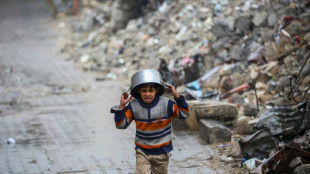
-
 Laos hostel staff detained after backpackers' deaths
Laos hostel staff detained after backpackers' deaths
-
Hong Kong LGBTQ advocate wins posthumous legal victory

-
 Ukraine says cannot meet landmine destruction pledge due to Russia invasion
Ukraine says cannot meet landmine destruction pledge due to Russia invasion
-
Rod Stewart to play Glastonbury legends slot

-
 Winter rains pile misery on war-torn Gaza's displaced
Winter rains pile misery on war-torn Gaza's displaced
-
'Taiwan also has baseball': jubilant fans celebrate historic win

-
 Russia pummels Ukraine with 'record' drone barrage
Russia pummels Ukraine with 'record' drone barrage
-
Paul Pogba blackmail trial set to open in Paris

-
 China's Huawei unveils 'milestone' smartphone with homegrown OS
China's Huawei unveils 'milestone' smartphone with homegrown OS
-
Landmine victims gather to protest US decision to supply Ukraine

-
 Indian rival royal factions clash outside palace
Indian rival royal factions clash outside palace
-
Equity markets retreat, dollar gains as Trump fires tariff warning

-
 Manga adaptation 'Drops of God' nets International Emmy Award
Manga adaptation 'Drops of God' nets International Emmy Award
-
China's Huawei launches 'milestone' smartphone with homegrown OS

-
 Philippine VP denies assassination plot against Marcos
Philippine VP denies assassination plot against Marcos
-
Four Pakistan security forces killed as ex-PM Khan supporters flood capital

-
 Hong Kong's legal battles over LGBTQ rights: key dates
Hong Kong's legal battles over LGBTQ rights: key dates
-
US lawmakers warn Hong Kong becoming financial crime hub

-
 Compressed natural gas vehicles gain slow momentum in Nigeria
Compressed natural gas vehicles gain slow momentum in Nigeria
-
As Arctic climate warms, even Santa runs short of snow

-
 Plastic pollution talks: the key sticking points
Plastic pollution talks: the key sticking points
-
Indonesia rejects Apple's $100 million investment offer

-
 Pakistan police fire tear gas, rubber bullets at ex-PM Khan supporters
Pakistan police fire tear gas, rubber bullets at ex-PM Khan supporters
-
Ronaldo double takes Al Nassr to brink of AFC Champions League last 16

-
 Pakistan police fire tear gas, rubber bullets at pro-Khan supporters
Pakistan police fire tear gas, rubber bullets at pro-Khan supporters
-
Hong Kong same-sex couples win housing, inheritance rights

-
 Indonesia digs out as flooding, landslide death toll hits 20
Indonesia digs out as flooding, landslide death toll hits 20
-
Liverpool's old guard thriving despite uncertain futures

-
 Mbappe takes reins for Real Madrid in Liverpool clash
Mbappe takes reins for Real Madrid in Liverpool clash
-
As AI gets real, slow and steady wins the race

-
 China's Huawei to launch 'milestone' smartphone with homegrown OS
China's Huawei to launch 'milestone' smartphone with homegrown OS
-
Porzingis and Morant make triumphant NBA returns

-
 Hong Kong top court affirms housing, inheritance rights for same-sex couples
Hong Kong top court affirms housing, inheritance rights for same-sex couples
-
Philippines, China clashes trigger money-making disinformation

-
 Most Asian markets drop, dollar gains as Trump fires tariff warning
Most Asian markets drop, dollar gains as Trump fires tariff warning
-
England 'not quivering' ahead of New Zealand Test challenge

-
 Bethell to bat at three on England Test debut against New Zealand
Bethell to bat at three on England Test debut against New Zealand
-
Trump vows big tariffs on Mexico, Canada and China

-
 New Zealand and England to play for Crowe-Thorpe Trophy
New Zealand and England to play for Crowe-Thorpe Trophy
-
Scheffler, Schauffele and McIlroy up for PGA Player of the Year

-
 Trump to face less internal pushback in new term: ex-commerce chief
Trump to face less internal pushback in new term: ex-commerce chief
-
Extreme weather threatens Canada's hydropower future

-
 More than 34,000 register as candidates for Mexico judges' election
More than 34,000 register as candidates for Mexico judges' election
-
Australia ban cycling's Richardson for life after UK defection

-
 Internal displacement in Africa triples in 15 years: monitor
Internal displacement in Africa triples in 15 years: monitor
-
'Remarkable global progress': HIV cases and deaths declining

-
 Social media firms raise 'serious concerns' over Australian U-16 ban
Social media firms raise 'serious concerns' over Australian U-16 ban
-
Tiger to skip Hero World Challenge after back surgery

-
 MLB shifts six 2025 Rays games to avoid weather issues
MLB shifts six 2025 Rays games to avoid weather issues
-
US women's keeper Naeher retiring after Europe matches


Under shadow of drought, Santiago ditches exotic plants
With drought casting a constant shadow over Santiago's 7.1 million residents, there has been a recent rush to replace thirsty, exotic plants with hardier, native ones in the hopes of staving off water rationing.
One of Latin America's most urbanized cities has experienced more than a decade of drought, and managing water access for its fast-growing population is becoming increasingly difficult.
Last year saw the driest winter -- the rainy season in Chile -- this century, with 71 percent lower rainfall for Santiago than usual, according to the national meteorological office.
Predictions are equally dire for the southern-hemisphere winter about to start with the Mapocho River at 57 percent of capacity, the Maipo River at 61 percent and the El Yeso reservoir at just over two-thirds full.
City authorities are bracing for tough times ahead.
"We can’t make it rain. That is out of our hands, but we can prepare for... an extreme situation," said Claudio Orrego, governor of Santiago.
Last week, the municipal government announced a four-step crisis plan that starts with encouraging voluntary water conservation but could end in a "Red Alert" phase of rationing.
If the water runs out, cuts will be rolled out to one sector of the city at a time, for a maximum of 24 hours each, under the plan.
It could affect some 142,000 households supplied by the Mapocho River, which bypasses Santiago from east to west, and another 1.5 million that rely on the Maipo River to the south.
- 100,000 trees -
Every day, agricultural engineer Pablo Lacalle -- head of water resources at the Santiago Metropolitan Park (Parquemet) -- guages the level of the Mapocho River.
Last year, the water level fell by more than half, according to official data.
"We have to plan... to know how much irrigation capacity we will have," Lacalle told AFP with a concerned look.
"We have a deficit of about 87 percent of water in the park compared to previous years... Fifteen years ago the park had enough water to irrigate everything."
Faced with the new reality, the park is rolling out a drought-busting re-planting plan.
"We have replaced exotic forest with native forest," with 100,000 trees replanted in three years on the park's northern slope, Parquemet director Eduardo Villalobos said.
Last year, pasture in the park was reduced by 50,000 square meters and replaced with endemic plants.
- Every drop 'precious' -
In the city itself, some are starting to take aim at green grass.
Urban architect Joaquin Cerda in 2021 launched a movement against "European-style" grass-lined sidewalks.
His project, "Vereda Nativa" (Native Sidewalk), has so far replaced some 150 square meters (1,600 square feet) of grass in the neighborhood of Pedro de Valdivia Norte with 25 native plant species.
These were more adept, he said, to the climate of Santiago, "to prolonged drought and to live a long time without water," he told AFP.
Now, "we water here once a week for half-an-hour using drip irrigation," said Cerda, reducing water consumption to less than a tenth of what it was before.
"Every drop of water is very precious."
According to the World Bank, annual precipitation in Chile's coastal regions has decreased by 15 to 30 percent in the last century, leading to multiple periods of severe drought.
Climate change would likely change the frequency and magnitude of hazards such as wildfires and droughts, with risks for economic growth and public health, it says.
Access to water has become an increasingly contentious point in Chile.
Legally, water is a resource for public use, but the government has granted almost all exploitation rights to the private sector.
Industry accounts for about 20 percent of consumption and agriculture another 70 percent, with avocado -- a major Chilean export -- a particularly thirsty crop.
This all posed little problem in times of abundance, but drought brought a furious reaction in 2020 when some communities started running out of water.
Protesters occupied a well managed by a copper mining company, demanding it be used to provide water to communities instead.
The Constitutional Convention drafting a proposed new founding law for Chile on Monday approved an article stating that water is an "inalienable public good."
N.Fournier--BTB
